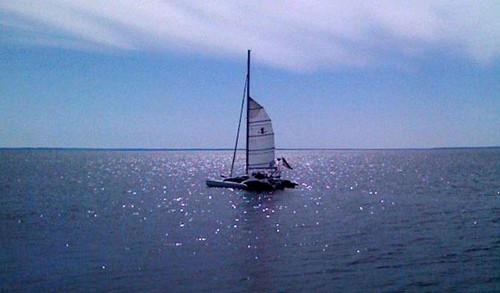Following the adventurers- Captain Cook sails the Arctic
by Forrest Johnson, News Chronicle/Sail-World on 10 Apr 2009

The Lemuel R. Brigman III setting out from Two Harbors SW
Frederic Cook claimed to be the first explorer to reach the North Pole, and Captain James Cook was maybe the greatest marine explorer of his time..
..and now, there's another Captain Cook who is off to explore, but his attempt to solo sail the fabled North-West Passage is part of a new age that wouldn't be possible without global warming.
Capt. Tommy D. Cook of Port Angeles, Washington is headed solo toward arctic waters and the fabled northwest Passage in his 31-foot Corsair trimaran, the Lemuel R. Brigman III.
Cook left Agate Bay in Two Harbors on Tuesday, bound for the Apostles and the Soo Locks, headed toward the St. Lawrence River and the open seas of the Canadian coast. The former Coast Guard boatswain will creep up the Labrador coast under sail as summer beckons, staying in touch with support crewmen Ken Birdwell and Ben 'Tiny' Straight back in the States as they keep watch by satellite on the conditions of the ice pack in the seas above the continent. By mid-to-late July, perhaps August, Cook is hoping to make the dash through the Parry Channel westward toward Alaska and Nome.
'I’m not out to set records,' he said. 'I just want to go and have an adventure.'
Birdwell will head back to Bellevue, Washington to monitor ice conditions and weather and convey that information by satellite phone to Cook. Straight will follow Cook with the motorhome as he makes his way east through the Great Lakes, meeting up where they can.
Cook and his support crew, whom he met while working on the tallship Lady Washington, started in Duluth over the weekend, hoping to begin the voyage at the farthest west point of Lake Superior. However, ice conditions frustrated the start until they reached Two Harbors, where it looked almost possible to to squeeze the boat through the snowbanks and into Agate Bay.
A quick call to the city got a front end loader at the scene to widen the entry a bit and a group of locals began to befriend Cook and his crew.
'I was hoping to start at the westernmost point but then I wouldn’t have met all these nice people,' Cook said.
He plans on using his 2,000 mile journey across the Great Lakes to acclimate himself with the boat, giving himself a couple of months to 'break things and get them fixed before I head out into the open ocean.'
Having always been drawn to the sea, and mentored by his friend Lemuel R. Brigman III who died in 2006 at age 86, Cook said the idea of making the arctic crossing came to fruition when the ice cleared for the first time ever in the summer of 2007.
'The passage has gone ice free the past two years and this year they’re expecting it to go out even sooner,' said Cook. 'Global warming is having an impact on the high arctic. It was time to get going.'
Cook had first thought of building a steel-hulled boat that could withstand shifting ice but he decided on the catamaran and its speed and agility. The craft can zip along at over 20 knots (23 mph) and the plan is to navigate his way through the open leads and pack ice fast enough to avoid too much trouble. The arctic crossing could take up to a month. The ice is expected to open even earlier this year and Cook is expecting to enter arctic waters in July and make his way through Parry Channel westward toward Point Barrow and the Beaufort and Berring seas and eventually Nome, Alaska by late August or early September.
Birdwell and Straight will head north to join Cook at journey’s end to put the boat up for winter. The threesome will head back to Washington and Cook will return when the ice is out in Nome to pilot the craft along the Alaska coast and eventually back to Port Angeles in the summer of 2009.
Living quarters on the Brigman are sparse to say the least. A small kitchen space, a bunk, a propane fireplace for heat, a composting toilet. A small wind weather vane will provide enough electricity to keep a couple of 12-volt batteries charged. Cook will rely on GPS and some electronic navigation equipment but he’ll also be navigating the old fashioned way, shooting directions by celestial navigation with sextant and compass. A sweeper oar will help him when the winds die down. He does have a 9-horse outboard but he plans to stow it once he’s out of the Great Lakes.
Oh, and he does have a small keyboard to keep him in music.
'A gentleman never goes to sea without a piano,' he said, quoting from a now-forgotten source.
Sail-World will be following his journey as his adventure unfolds
If you want to link to this article then please use this URL: www.sail-world.com/55676